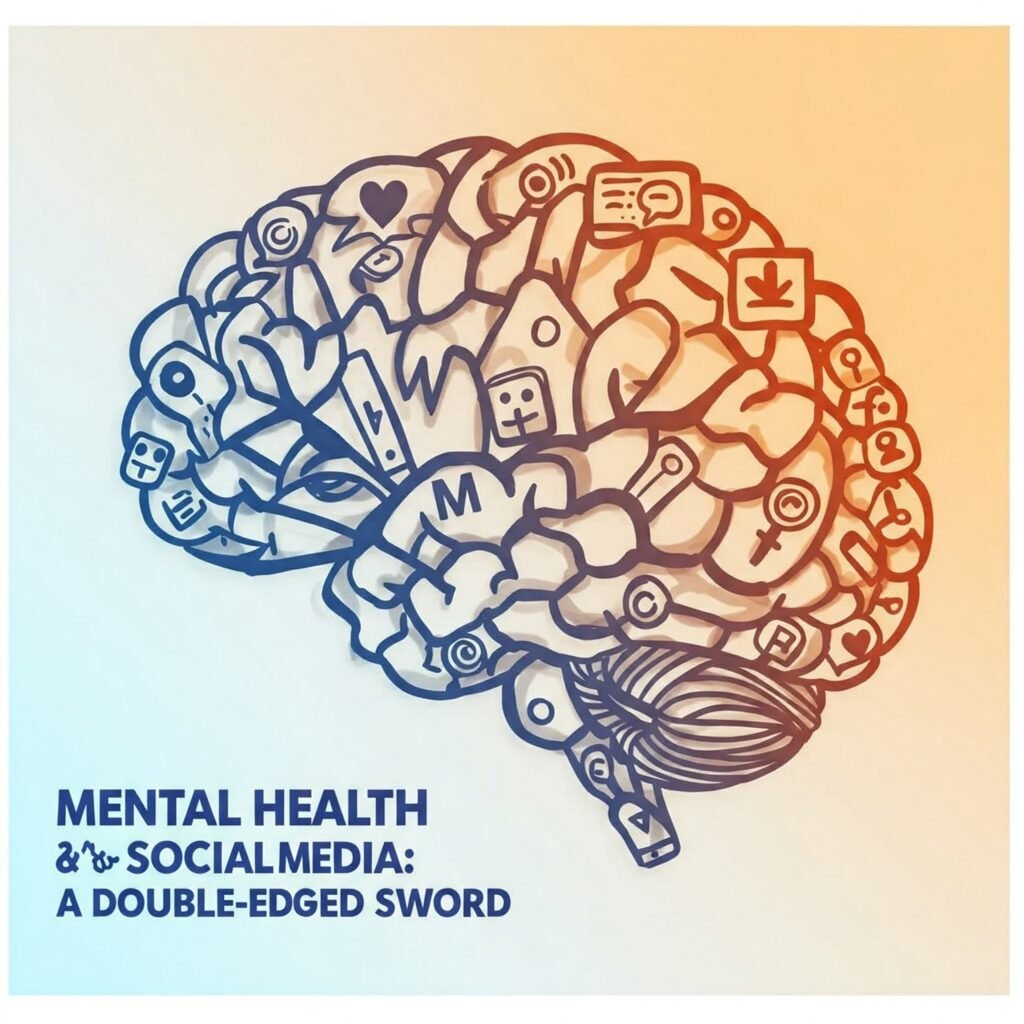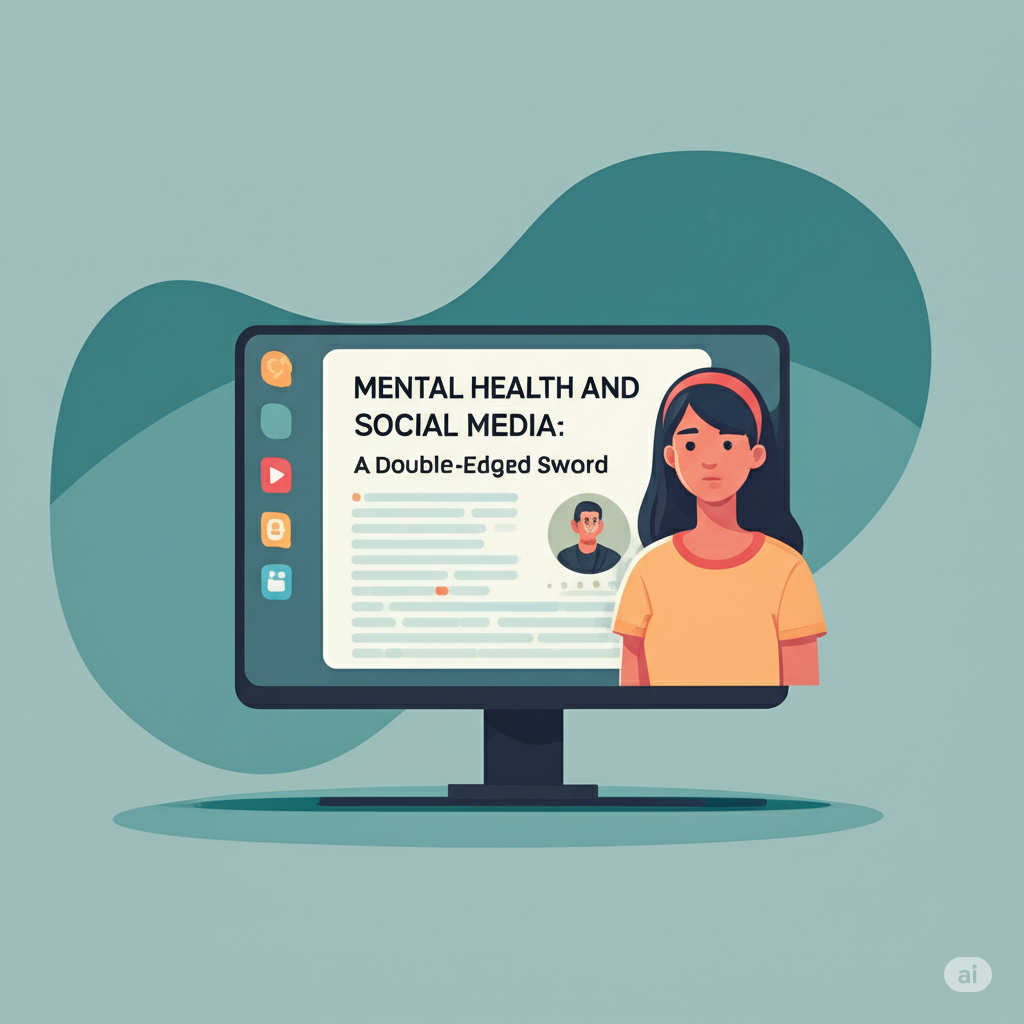In smartphones and continuous connections, social media has come to be an vital part of present day existence. Platforms such as Instagram, Twitter, Facebook and Tiktok have modified how humans communicate the world, parts and appearance.
While social media has supplied many profits – for instance, get entry to to higher conditions, social feelings and records – it additionally has a deep web page. Its impact, specially on intellectual health, has raised purple flags amongst psychologists, instructors and customers. Social media is a two -to -sword: it could both do electricity or damage, it relies upon on how it’s miles used.
Rise of Social Media
Over the beyond two a long time, the use of social media has skyrocketed. In 2024, extra than four.5 billion human beings spent social media globally, on common more than 2.5 hours. This has turn out to be the maximum essential way folks who speak, learn and entertain themselves.
This digital shift has changed the social situation. People now maintain friendships, do business or even fall in love online. But as the digital world grows, precise intellectual health challenges are. While many customers sense greater informed and related than ever, others discover themselves beaten, distracted and emotionally dried with a continuous glide of facts and evaluation.

The Positive Side of Social Media
Despite the loss, social media can positively affect intellectual health when used by the mind. Here are some blessings:
1. Community and Connection
For many people – mainly those who experience distant or marginalized – give the experience of social media belonging. Online organization allows people to touch part or fight, whether it is a hobby, a unique position or life experience.
The mental fitness environment provides help from cooperative who will not be offline. This is important for those who work with disappointment, anxiety or PTSD, who can be from themselves in all other cases. With the help of platforms such as Reddit or even non-public Facebook companies, people can serve as a lifeline for those who have a loss of society.
2. Consciousness and School Education
Social media is a powerful tool to increase the recognition of mental health. Psychologists and not order companies use it to educate the target market and break the stigma.
Campaigns like #mentalhealthawareness encourage open dialogues and help people search for help with insults. Impressive and spokesmen for mental fitness often offer a percentage of stories and treatment trips, concepts and tangible governance to others who can struggle.
3. Emotions and Creativity
Creative expression is scientific, and the system that includes ticket chefs and Instagram relationship art, music or stories. This can be cured to separate yourself, especially for individuals who are orally struggling for emotions.
Positive response can promote self -confidence and provide confirmation. In addition, some customers are able to recognize their voice and accept the production of online drugs, in addition to new self -managing directors or professional opportunities.
4. Access to Mental Health Services
Many therapists use social media to share tips and resources. Teletherapy and mental wellness apps often integrate with social platforms, making it easier to access help.
During the COVID-19 pandemic, for example, many individuals turned to virtual therapy found through Instagram ads or YouTube videos that connected them to legitimate professionals. This accessibility can bridge gaps in mental health services for rural or underserved populations.

Negative Effects of Social Media on Mental Health
While positivity is excellent, the harmful results of social media on intellectual health are getting more and more clear.
1. Problems with Assessment and Confidence
Social media promotes bad comparisons. Users regularly upload best variations of life, which decide unrealistic standards of beauty, fulfillment and happiness.
For younger people and teenagers, it can provide rise to emotions of insufficiency, much less self -self assurance and frame pix. The use of filters, foot editing apps and curated existence has made it difficult for users to distinguish among authenticity and confusion.
2. Cyberbullying and Harassment
Social media may be a foundation for poisonous conduct. Cyberbulling, trolling and harassment are extensive troubles. The sufferers regularly revel in the ideas of depression, anxiety and suicide as a result.
Unlike individual bullying, cyberbulling is tireless. An oblivion makes it tough to make on line bulls on-line. Victims might also sense that they are able to never avoid their pain completely, specifically when harassment follows them on many structures.
3. Addiction and Fatigue
Social platforms are designed for dependancy. The cause of facilities including roll and information is to preserve users busy.
This ends in obligatory use, frequently sound asleep fees, interplay and productivity in existence. Dopamine -Do remarks symbols, shares, feedback calculate the neurological outcomes of Nash. Over time, it can be tough for customers to focus on offline, loosen up or enjoy.
4. Fear of Disappearance (FOMO) and Anxiety
Looking at other journeys, taking part in activities or a few milestones can trigger the froth. This tape leads to social media surveys and dissatisfaction with life.
5. Depression and Loneliness
While designed to connect, social media can increase loneliness. Studies show higher usage correlates with perceived isolation and melancholy, particularly among teens.
Superficial online interactions frequently don’t satisfy the want for deep, actual-global relationships. In truth, consistent social exposure without actual engagement may additionally heighten emotions of rejection or exclusion when posts go unnoticed or receive constrained comments.
Vulnerable Populations
Certain agencies are extra at risk of negative effects:
- Teens and Adolescents: Developing identities make them at risk of peer pressure and low self-esteem.
- People with Mental Health Conditions: Social media can get worse anxiety, despair, or OCD.
- Women and Girls: They face more look-based totally criticism and harassment.
- Marginalized Communities: These users can also discover help but also face discrimination and hate.
For these organizations, targeted support, inclusive on line spaces, and stronger platform policies can make a significant difference in how they revel in social media.
The Role of Algorithms
A important issue in social media’s impact is algorithms. These structures dictate what users see, often reinforcing existing beliefs and feelings. If a person engages with poor content, they’ll be fed extra of it.
This can perpetuate body photo problems, suicidal ideation, or extremism. The loss of transparency round algorithms increases moral concerns. More focus and manipulate over what’s being proven can empower users to form more healthy virtual environments for themselves.
Striking a Balance
The key to healthy social media use lies in intentionality and cognizance. Here are a few suggestions:
- Set Time Limits
Use gear like Screen Time (iOS) or Digital Wellbeing (Android) to manipulate usage. This prevents overexposure and decreases addiction dangers. - Curate Your Feed
Follow debts that inspire and teach. Unfollow those that motive anxiety or negative assessment. - Take Breaks
Digital detoxes can reset your intellectual state. Use that point to reconnect offline. Even a 24-hour smash can appreciably lower strain stages and enhance mood. - Practice Critical Thinking
Understand that on-line content material is regularly curated. Don’t expect people’s lives are as perfect as they appear. Encourage media literacy and wondering of the source and purpose behind content. - Engage Meaningfully
Prioritize first-class over quantity. Comment, join, and percentage authentically instead of mindlessly scrolling. Deep interactions are more emotionally pleasurable than surface-degree engagement. - Seek Help
If social media affects your mental health, do not forget therapy. Many specialists now provide on line sessions. Apps like BetterHelp or Talkspace make get admission to easier than ever.
Role of Parents, Educators, and Policymakers
Addressing those issues is a shared obligation. Parents and instructors have to teach digital literacy and mental wellness. Schools can include training on wholesome on line conduct.
Governments and tech groups should also act. Stronger regulations on statistics privacy, content moderation, and algorithm transparency are vital. Platforms must deliver users better gear to manage their reviews and get admission to support.
Educational establishments can consist of intellectual health and virtual well-being as a part of their core curriculum. When younger users are ready with the proper information and critical thinking tools, they’re better prepared to navigate social media consciously and constructively.
Conclusion
Social media is neither completely top nor bad—it’s a device. Its effect depends on how it is used. While it gives connection, training, and empowerment, it also poses critical intellectual fitness dangers.
Through virtual mindfulness and collective obligation, we are able to ensure social media turns into a pressure for proper. The double-edged sword cuts each ways—the selection is ours. For more blogs visit here.
